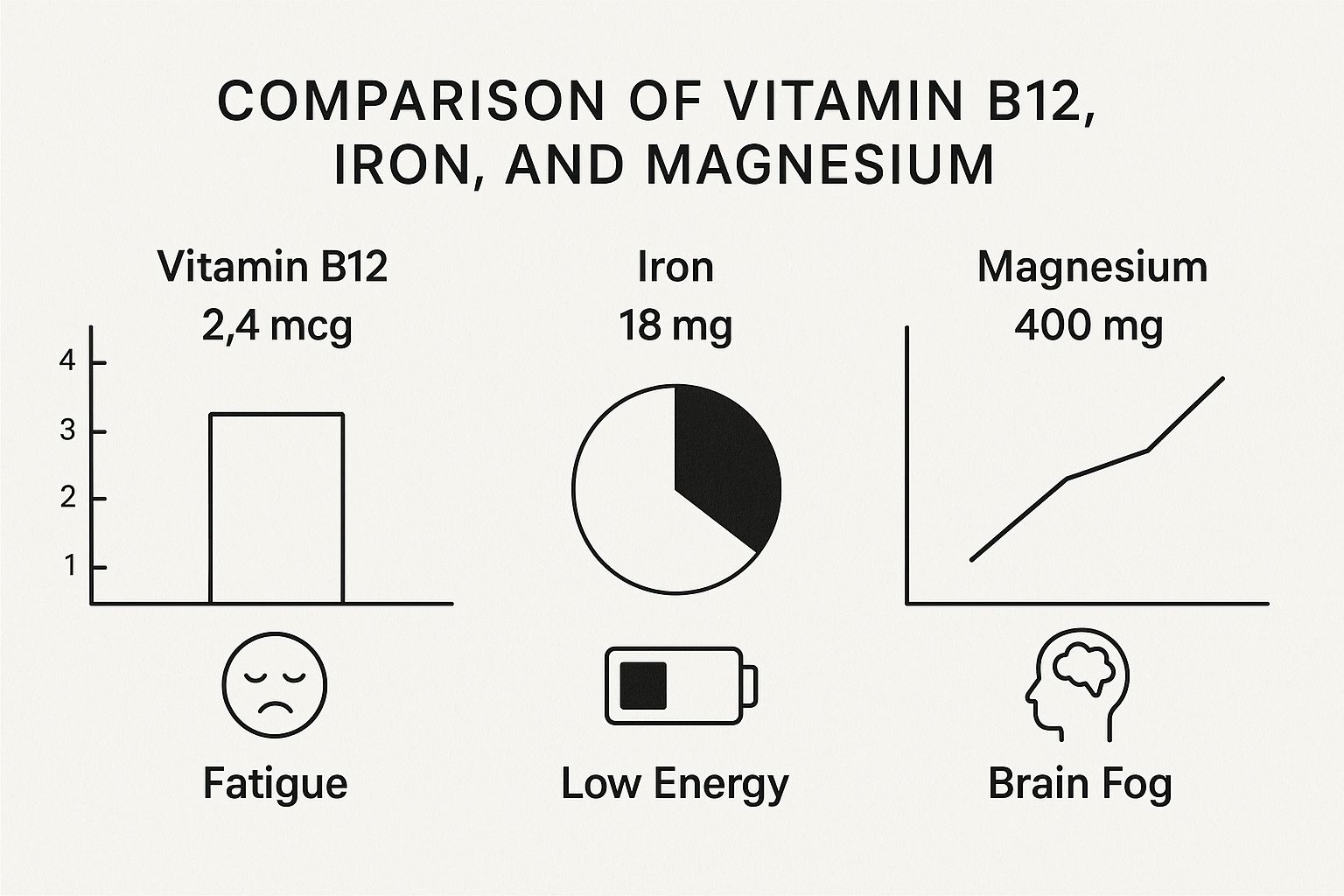Top Alternatives to Caffeine for Energy Boosts You Can Try
If you're looking for steady, reliable energy without the jitters, you've got better options than just another cup of coffee. Think adaptogenic herbs like Ashwagandha, essential nutrients like B vitamins, and even simple habits like strategic hydration.
These aren't quick fixes. They're smart investments in your body's natural energy systems, giving you a sustainable boost instead of a temporary high that inevitably leads to a crash.
Moving Beyond the Caffeine Crash

Does this cycle sound familiar? You chug coffee to start the day, hit a wall by mid-afternoon, and then struggle with restless nights. If so, you’re definitely not alone in wanting to get off the caffeine rollercoaster. More and more people are realizing that relying on stimulants comes with some serious downsides.
Think of caffeine as a high-interest loan on your energy. It gives you a quick burst right now, but you pay for it later—often with interest—leaving you feeling even more drained. This dependency can throw your whole system out of whack.
The Problem with Borrowed Energy
When you rely on caffeine, you get trapped in a borrowing cycle that’s tough to break. That first rush feels productive, but it's always followed by a slump, tempting you to reach for another cup. This pattern messes with your body's natural rhythm and torpedoes your sleep quality.
The most common complaints include:
- The Jitters and Anxiety: That over-caffeinated, on-edge feeling is a classic sign you've had too much.
- The Inevitable Crash: The steep drop-off in energy that leaves you feeling worse than when you started.
- Poor Sleep Quality: Caffeine can disrupt deep, restorative sleep, even if you drink it hours before bed.
The search for better energy sources has kicked off a massive shift in the market. The global energy drink industry hit a value of around USD 87 billion in 2024 and is projected to soar past USD 134 billion by 2030. A huge driver of this growth is the demand for products with natural, non-caffeine ingredients.
The good news is there's a much better way to power your day. By supporting your body’s own systems, you can switch from borrowed energy to genuine, lasting fuel. This guide will show you how to do just that, and if you’re already dealing with the nasty side effects of overuse, check out our guide on how to stop caffeine jitters.
How Adaptogenic Herbs Build Resilience and Energy

Imagine your body has a personal thermostat for managing stress. When things get too intense, it dials down your response. When you’re feeling sluggish, it nudges your energy up. That’s the core idea behind adaptogens, a special class of herbs that help your body adapt to physical and mental pressures.
Unlike the jarring jolt from caffeine, adaptogens work behind the scenes. They don't force an energy spike. Instead, they help balance your body's internal systems—especially the adrenal glands, which are command central for your stress response. This creates a much smoother, more stable energy lift without the dreaded crash later on.
Understanding the Adaptogenic Effect
The main job of an adaptogen is to help your body maintain homeostasis, which is just a fancy word for a stable internal balance. When you face a stressor—whether it's a tight deadline or a tough workout—your body pumps out cortisol. Chronically high cortisol is a recipe for fatigue, brain fog, and total burnout.
Adaptogens step in to moderate this whole process. They support your adrenal function, helping to regulate cortisol production so your system doesn't get overwhelmed. This support translates directly into better stamina, sharper focus, and greater resilience against daily fatigue.
These powerful alternatives to caffeine for energy are anything but new. Herbs like Rhodiola Rosea and Ashwagandha have been staples for centuries in Asia and Russia to fight off fatigue and boost mental performance. Modern science is now catching up, confirming that Rhodiola can cut down on mental fatigue and enhance cognitive function at doses between 200 to 600 mg daily. Likewise, ginseng has been a cornerstone of traditional Chinese medicine for ages, revered as a tonic for restoring vitality.
Key Adaptogens for a Caffeine-Free Boost
Not all adaptogens work the same way; each one brings something unique to the table. Figuring out their individual strengths helps you pick the right tool for the job.
- Ashwagandha: Famous for its calming effects, Ashwagandha is perfect for anyone who feels "wired but tired." It helps dial down stress and anxiety, which in turn preserves your energy reserves for when you actually need them.
- Rhodiola Rosea: This herb is prized for its ability to fight fatigue and improve mental clarity under pressure. Think of it as your secret weapon for endurance during long, demanding days, making it one of the top alternatives to caffeine for focus.
- Ginseng (Panax): Often called the "king of adaptogens," Ginseng is a potent energizer that boosts both physical stamina and cognitive function. It provides a clean, noticeable lift without ever overstimulating your system.
By incorporating adaptogens into your routine, you shift from borrowing energy to building it. Instead of masking fatigue with a temporary stimulant, you are actively strengthening your body's ability to manage stress and produce its own lasting energy.
Pairing these herbs with other cognitive enhancers can create an even more powerful effect. You can dive deeper into this idea by checking out our comprehensive guide to nootropic stacks and their benefits. This strategy lets you build a personalized toolkit for sustained mental and physical performance.
Fueling Your Body with Foundational Nutrients
Real, sustainable energy isn’t something you can just borrow with a stimulant; it has to be built from the ground up, right at the cellular level. Think of your body like a high-performance engine. Even the best engine is useless without quality fuel and working spark plugs. Foundational nutrients—especially key vitamins and minerals—are those essential components that literally ignite your body's natural energy production.
Instead of just masking fatigue, focusing on your nutritional foundation gives your body the raw materials it needs to perform. This approach creates a steady supply of vitality that caffeine can only mimic for a little while.
The Spark Plugs of Your Cellular Engine
Certain nutrients are non-negotiable for converting the food you eat into usable energy. When these run low, your entire system feels sluggish, no matter how much you rest or how many coffees you drink.
B vitamins, particularly B12, are star players here. They are absolutely critical for breaking down carbs and fats into glucose, your body’s go-to fuel source. A B vitamin deficiency feels like trying to run a car on a clogged fuel line—the power just isn’t there.
This infographic breaks down the daily needs and tell-tale deficiency signs for three of the most important energy-boosting nutrients.

As you can see, even small nutritional gaps can lead directly to the fatigue, low energy, and brain fog that so many people mistakenly blame on a lack of caffeine. This is why addressing nutrition is one of the most powerful alternatives to caffeine for energy—it actually solves the problem at its source.
Building Your Nutritional Foundation
Two other critical minerals for energy are iron and magnesium. Iron is a core component of hemoglobin, the protein in red blood cells that ferries oxygen from your lungs to every other part of your body. Low iron means less oxygen for your muscles and brain, which leads directly to physical weakness and mental exhaustion.
Magnesium, on the other hand, is involved in over 300 biochemical reactions in the body, including the direct creation of energy. It helps activate ATP (adenosine triphosphate), the main molecule for storing and transferring energy in your cells. Without enough magnesium, your cellular batteries just can’t hold a full charge.
A nutrient-first strategy is all about giving your body what it truly needs to perform. By ensuring you have solid levels of these core vitamins and minerals—either through whole foods or smart supplementation— you build a resilient energy reserve that doesn't depend on outside stimulants.
Incorporating these foundational nutrients is a powerful first step. And if you're looking to explore other gentle yet effective stimulants, you can learn more about why theobromine is an excellent ingredient in energy drink alternatives for a smoother, cleaner lift.
Building Sustainable Energy with Lifestyle Habits

While targeted supplements and nutrients give you a serious edge, true, lasting vitality is built on a foundation of daily habits. These practices are the bedrock of your energy production. Without them, even the best nootropics are just a temporary fix—like putting a high-performance engine in a car with flat tires.
Building sustainable energy is all about creating a lifestyle that supports your body’s natural rhythms instead of constantly fighting them with stimulants. These simple, consistent actions have a more profound impact than any single product, empowering you to generate your own clean energy from the moment you wake up.
Reset Your Clock with Morning Light
One of the most powerful alternatives to caffeine for energy doesn’t come in a bottle. It comes from the sun.
Getting just 10-15 minutes of natural sunlight in your eyes shortly after waking is a game-changer. It anchors your circadian rhythm, which is your body’s internal 24-hour clock. This simple act signals to your brain that the day has started, triggering a healthy cortisol release (the energizing kind) and shutting down melatonin (the sleep hormone). A quick morning walk can literally reset your entire energy schedule for the day, leading to sharper alertness in the morning and deeper sleep at night.
Hydration: The Ultimate Weapon Against Slumps
That all-too-familiar afternoon slump? It’s usually not a caffeine deficiency—it’s a hydration problem. Even mild dehydration can thicken your blood, forcing your heart to work harder to pump oxygen to your brain and muscles. The result is fatigue and brain fog.
Staying properly hydrated is one of the quickest ways to keep your energy levels stable. Aiming for around nine cups of fluids for women and 13 for men daily keeps your brain sharp and your cellular engines running smoothly.
Don’t wait until you’re thirsty. By then, your performance is already taking a hit. Make hydration a proactive habit instead.
- Start your day with a glass of water. You’re naturally dehydrated after a long night’s sleep.
- Keep a water bottle visible. Having it on your desk is a constant visual cue to drink up.
- Eat your water. Load up on water-rich foods like cucumbers, oranges, and watermelon.
These strategies ensure your body has the fluid it needs to transport nutrients and maintain peak cognitive function all day. To make your hydration work even harder, pair it with our Dialed In Focus Pouches, designed to sharpen attention and mental clarity.
Mindful Movement for Mental Clarity
When you feel mentally stuck or tired, your first instinct might be to sit still and conserve energy. But the opposite is often what you really need. Short bursts of mindful movement can do more to clear your head than another cup of coffee ever could.
A brief 5-minute walk, a few stretches at your desk, or even some simple yoga poses can work wonders. This kind of movement boosts blood flow, delivering a fresh supply of oxygen and nutrients straight to your brain. It helps flush out metabolic waste and enhances cognitive function, giving you a natural lift in focus and clarity. It’s a powerful reminder that sometimes, the best way to refuel your mind is to move your body.
Finding the Right Caffeine Alternative for You
Ditching caffeine doesn't mean you have to settle for low energy. But finding the right alternative isn’t about swapping one stimulant for another—it’s about building a personalized toolkit that matches your actual needs.
There’s no magic bullet here. The ideal energy source for a stressed-out executive needing mental clarity is completely different from what an athlete needs for peak physical endurance.
The key is to get strategic. Instead of randomly trying different supplements, you need to pinpoint your primary goal and choose the tools that directly support it.
Tailoring Your Energy Strategy
Let's break down a few common scenarios. See which one sounds most like you, and you’ll have a clear starting point.
- For the Stressed Executive: Your days are packed with high-stakes meetings and relentless pressure. You don't just need more energy; you need to quiet the mental noise. An adaptogen like Ashwagandha is a fantastic place to start. It helps manage cortisol levels and dials down that awful "wired but tired" feeling.
- For the Student Facing Exams: Long study sessions require cognitive endurance, not a quick jolt. Here, foundational brain fuel like B vitamins and iron are non-negotiable for powering your brain’s cellular engines. Pair these with a gentle, non-jittery stimulant like theobromine, and you can stay sharp for hours without the inevitable crash.
- For the Athlete Seeking Endurance: Physical performance demands a totally different kind of fuel. An adaptogen like Rhodiola Rosea is a game-changer for fighting physical fatigue and boosting stamina. When you combine this with solid hydration and a nutrient-dense diet, you create a powerful foundation for performance.
This tailored approach is catching on globally. People are waking up to the need for smarter energy solutions. In China, for example, health-conscious urban consumers now drive about 50% of the energy drink market. Meanwhile, European customers are all-in on 'clean label' products with less sugar, demanding functional blends of vitamins and amino acids for a smoother lift.
Creating a Synergistic Effect
The real magic happens when you start combining strategies. Layering different approaches creates a powerful synergistic effect that no single tactic can match.
For instance, taking a daily adaptogen supplement is good. But pairing it with better sleep habits (like getting morning sunlight) builds a much more resilient energy system overall.
Think of it like building a team. Your foundational habits—sleep, hydration, and nutrition—are your star players. The supplements and herbs are your specialized support staff, called in to handle specific challenges.
Ultimately, this personalized roadmap puts you in control. To dig deeper into how specific ingredients can support your goals, check out our guide on why Dialed In is the better focus and energy gum. Once you understand what your mind and body truly need, you can build a customized energy toolkit that helps you thrive.
So, What's Next?
We've covered a lot of ground, and the big takeaway is this: finding clean, all-day energy without caffeine isn't just a nice idea—it's completely achievable. It's about getting smarter with your energy sources.
By turning to adaptogens, fueling your body with the right nutrients, and locking in a few key lifestyle habits, you're building a foundation for real, sustainable vitality. This isn't about chasing quick fixes anymore. It's about making a long-term investment in how you feel and perform every single day.
You now have the playbook to get off the rollercoaster of jitters and crashes for good. It's time to build an energy system that actually supports you, not one that leaves you depleted.
The journey to sustained energy is a marathon, not a sprint. Consistency with these natural alternatives to caffeine will pay off in ways a short-term stimulant never could.
Ready to take the first step? Check out our targeted Energy Support collection, designed to help you thrive without the crash.
Frequently Asked Questions About Caffeine Alternatives
Ditching your daily caffeine habit is a big move, so it’s natural to have questions. Knowing what to expect makes the switch to cleaner, more sustainable energy a whole lot smoother. Let's tackle some of the most common ones.
How Long Until I Feel the Effects of Adaptogens?
Unlike the instant punch from a shot of espresso, adaptogens play the long game. Think of them less like flipping a light switch and more like slowly turning up a dimmer.
These smart herbs work by helping your body build resilience to stress over time. While some people report feeling a subtle shift in a week or two, you’ll likely need several weeks of consistent use to really notice the full benefits, like improved stamina and sharper mental clarity. Patience is everything—you're building a solid foundation for lasting energy, not just chasing a quick high.
Is It Safe to Combine Different Natural Energy Boosters?
Absolutely. In fact, "stacking" different natural compounds is often one of the smartest ways to get results, as long as you do it thoughtfully. Many of these ingredients work together, creating a synergistic effect that’s more powerful than any single one on its own.
A solid, effective stack might look something like this:
- An Adaptogen: Like Ashwagandha to keep stress in check.
- A Nootropic: Like L-theanine for that calm, dialed-in focus.
- A Foundational Nutrient: Like B-vitamins to fuel energy at the cellular level.
The idea is to support your energy from all angles—stress resilience, brainpower, and metabolic function. Just remember to start with a low dose whenever you try a new combination to see how your body gets on with it.
Are There Any Side Effects with These Caffeine Alternatives?
For most healthy adults, natural alternatives to caffeine for energy are very well-tolerated and considered safe. But of course, everybody is different.
Occasionally, some people might experience mild digestive upset when first trying out herbs like maca or ginseng. The best practice is always to start with a smaller dose and listen to your body.
The single most important thing you can do is choose high-quality products from brands you trust. This ensures you're getting pure, potent ingredients without any weird fillers or contaminants that could cause a bad reaction.
Got more specific questions about our ingredients, how to use our products, or what to expect? We’ve got you covered. Explore our comprehensive FAQs to get all the details you need to start with confidence.
Ready to build a smarter, more sustainable energy routine? The products at Dialed In Nootropics are designed to deliver clear focus and steady vitality without the crash. Find your perfect match and get started today at https://focuspouches.com.

